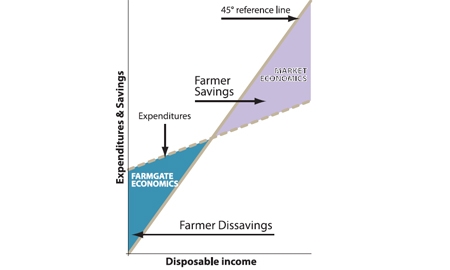
Ghana aims to become the biggest producer of rice in West Africa by increasing its rice crop tenfold to 200,000 metric tons.
It is an ambitious target. Currently, Ghana imports most of the rice it consumes, producing only 30 per cent of the amount it needs to feed its population and spending around $500 million dollars a year to make up the 70 per cent shortfall.
The potential to achieve the crop levels the government envisages is, nevertheless, very real. Ghana has vast fertile agricultural lands suitable for rice production, and climatic conditions are favourable.
However, the smallholder farmers who grow Ghana’s rice need help if production levels are to be raised – along with the low incomes on which the farmers themselves subsist.
To turn the dream into a reality the government is relying on the Global Agri-Development Company (GADCO), a privately-owned agribusiness company dedicated to producing consumer foods in West Africa through community-based partnerships. Focusing on cereal and protein-based foods, the company aims to transform the livelihoods of smallholder farmers and link them to growing food markets.
Established just four years ago and based in Accra, Amsterdam and London, GADCO is already Ghana’s largest rice grower. It currently has a 30-year lease on 1,000 hectares of farmland at Fievie in the Volta Region under a public private partnership agreement with the government. This is to be expanded to 4,000 hectares in the drive to step up rice production from 20,000 to 200,000 metric tons by 2015.
Iggy Bassi, co-founder and board member of GADCO, says smallholder farmers lack resources and access to markets. GADCO will bring in its international partners to train the farmers, provide better seeds to improve yield, and create local and international markets.
“Ghana needs to be a strong producer of quality rice and work hard to create regional export markets – to achieve this it needs key international partners to help build the capacity of Ghanaian farmers,” says Mr Bassi, who started GADCO with his business partner Toks Abimbola.
The New York-based Acumen Fund, which in February announced a $1.5 million equity investment in GADCO, says there is the potential to build the skills and triple the incomes of more than 7,000 smallholder farmers, improving an estimated 35,000 lives.
Rising demand for fast moving consumer goods (FMCGs) is being fuelled in West Africa by rising income levels, GDP growth, and rapid urbanisation.
“Integrating smallholders into competitive and sustainable FMCG value chains is not only essential for lifting smallholders out of poverty, but also for building regional solutions for food security and economic development,” says Mr Bassi.
He is calling on Ghana’s smallholder farmers to adopt modern agriculture practices so that their produce meets international standards.
Mr Abimbola, GADCO’s other co-founder and Chief Executive Officer, says the company opted to work in Ghana because of the political stability and the extent to which the government contributes towards agricultural development. The company is dedicated to preserving the environmental sustainability and responsible stewardship of Ghana’s agricultural land, he adds.
“In tandem with operational and development partners, GADCO will be launching a new initiative in 2012 to create core infrastructure from the farm-to-consumer products, underpinned by global standards and best-in-class technology from Brazil,” says Mr Abimbola.
“Our belief is that this partnership approach marks a genuine technical shift for Ghana and enables us to compete with global players, thus creating shared value for our stakeholders.”
The first 40,000 bags of the high quality long-grain Copa rice the company is introducing went on sale last September.
The Acumen Fund provides “patient” or long-term capital to companies working to transform livelihoods through market-based products and services.
Mr Bassi says Acumen will play a vital role in helping the company pursue its unique “creating shared value” business model across West African food markets, starting in Ghana.
“We are delighted with Acumen Fund’s investment and with its support in building inclusive value chains with smallholders for our Copa brand foods products,” he says.
2 COMMENTS
I am glad that this Company (GADCO) brought the idea to enhandce the smallscale farmers also to boost agricultural in general in Ghana.
I am glad that this Company (GAD CO) brought the idea to enhance the small scale farmers also to boost agricultural in general in Ghana.
I would suggest that there is a vast farmland which is also good for rice at Mafi Tordorkpe near Mafi- Kumase in Central Tongu, Volta region own by Gevie Clan can be acquired by company so that it serve as the source of employment for people in the area and its environs. Because the majority of the people in area are peasant farmers. hence their children (our brothers and sisters) suffered going to SHS and the tertiary institutions due to financial difficulties by the parents. Thanks.